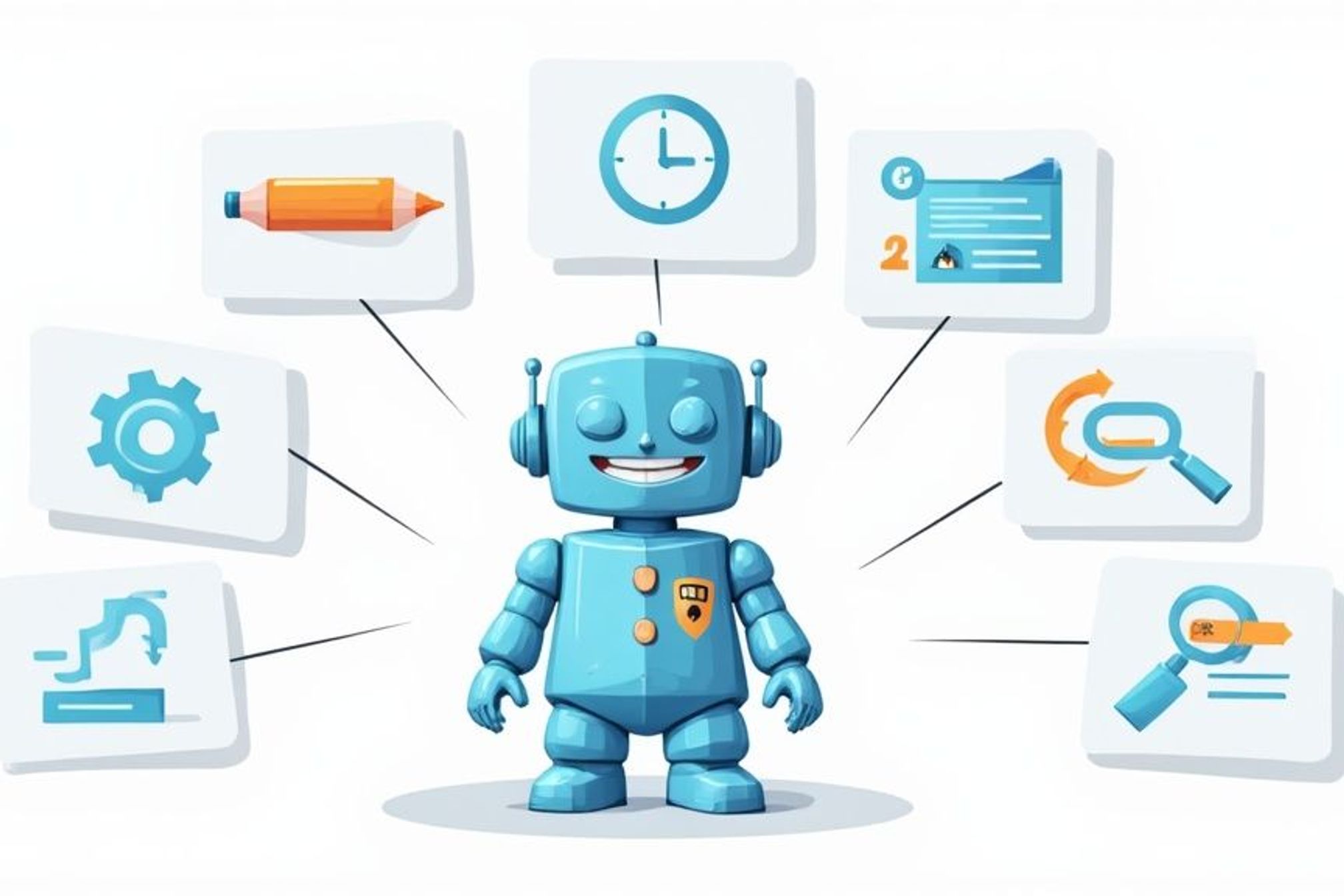
Imagine someone asks a smart assistant for the best coffee shop nearby, and your business pops up first. That's what’s happening right now with tools like ChatGPT. It's quickly becoming a new way people find information, products, and local services. But how does it decide which businesses to show? It isn't magic; it's based on specific signals we call ChatGPT Ranking Factors.
Think of them as the rules for a new kind of search engine. If you want your business to be the one recommended, you need to understand these rules. This guide breaks down the 8 most important factors in simple terms. We'll show you exactly what you need to do so ChatGPT finds and trusts your website as a good source. While you can't control the AI directly, you can guide it by giving it the best possible information. One powerful way to do this is to train ChatGPT with your specific business data, making sure it has the right details about what you offer.
This article will give you the basic knowledge to help your business show up in AI searches. Let's get your website ready for the future of discovery, starting today.
1. Crystal Clear Business Information (NAP)
Before we get into complex plans, one of the most basic ChatGPT Ranking Factors is getting the simple things right. ChatGPT, like search engines, needs to know that your business is real. It does this by checking your key business information across the web: your Name, Address, and Phone number (NAP).
Think of your NAP as your business’s digital fingerprint. When this information is the same everywhere it appears online—from your website to social media and local listings—it sends a strong signal of trust to the AI. This consistency confirms you are who you say you are, making ChatGPT more likely to recommend your services.
However, different information in different places creates confusion. A mix of old addresses, wrong phone numbers, or small changes in your business name (like "Smith's Bakery" vs. "Smith's Bake Shop Inc.") weakens this trust. The AI might not show your business because it doesn't want to give its users wrong information.
Easy Steps for Perfect NAP Information
To make sure your business information is a trusted source for AI, follow these steps:
- Create One Official Version: Decide on one official version of your business Name, Address, and Phone number and use it everywhere. This includes small details like using "Street" vs. "St."
- Check Your Online Presence: Use a tool or search for your business on major sites like Google Business Profile, Yelp, and Facebook. Write down every place your NAP information appears.
- Fix Any Mistakes: Carefully update any listings that don't match your official NAP. This can take time but is very important for building a strong foundation.
Key Insight: Having the same NAP information everywhere isn't just for local search; it helps prove your business is real to AI tools like ChatGPT. A clean digital footprint makes you a more reliable answer.
If you're not sure how your business looks to an AI, a check-up can show you hidden problems. You can get a free AI SEO audit with our AI Rank Tracker to see how your website is doing and find areas to improve.
2. Prompt Clarity and Specificity
While your website's information is very important, how a user asks ChatGPT a question is a powerful ranking factor too. The clearness and detail in a user's question (or "prompt") directly affects the AI's ability to find and recommend your business. A general question gets a general answer, but a specific question helps the AI find the most relevant sources.
Think of it like asking for directions. "Find a bakery" might show you any random shop. But "Find a bakery in downtown Austin that sells gluten-free sourdough and is open on Sundays" gives clear instructions. ChatGPT uses these details to search its knowledge, giving priority to businesses whose online information perfectly matches this detailed request. The more specific the prompt, the higher the chance a well-matched business will be shown.

This matters for your business because your website needs to have the specific words and details that users include in their questions. If your site clearly says you offer "gluten-free sourdough" and your location is "downtown Austin," you become a top choice for that user's specific question.
Easy Steps to Match Your Site with User Questions
To make sure your business is the answer to detailed user questions, you need to think like your customers and add those details to your site:
- Think About User Questions: Brainstorm the specific questions your ideal customers might ask. What special features or services do you offer? What problems do you solve? Create pages that directly answer these detailed questions.
- Be Specific on Your Website: Don't just say you're a "consultant." Say you are a "financial consultant for small tech startups who need help with first-round funding." This level of detail directly matches specific questions.
- Organize Your Content: Use clear headings, bullet points, and question-and-answer sections on your pages. This makes it easy for AI to read your information and match it to a user's question.
Key Insight: Being ready for specific questions isn't just about using the right words; it's about creating a complete profile of your business online. The more detailed and clear your website is, the more likely you are to be the perfect answer for a user's question.
To see if your website has the specific details AI tools look for, a special check-up can be very helpful. You can get a free AI SEO audit using our AI Rank Tracker to analyze how ready your site is for detailed AI searches.
3. Contextual Relevance and Coherence
Besides just having the right information, another key ChatGPT Ranking Factors is how that information is organized. ChatGPT prefers sources that are easy to understand. This means the AI looks for content that stays on topic, presents ideas in a logical order, and directly answers questions without getting sidetracked.
Think of it like a helpful conversation. When you ask a question, you expect an answer that sticks to the point. If your website’s content jumps between different topics or is jumbled, the AI will see it as a less reliable source. It prefers content where everything connects logically, creating a clear and easy-to-follow story for the user.

For example, a blog post about "small business accounting tips" should flow from setting up accounts to tracking spending, and then to getting ready for taxes. This logical order signals expertise and makes your content a great choice for AI-generated answers. Poorly organized content, however, might be misunderstood or ignored completely.
Easy Steps for Better Organization
To make sure your content is seen as a relevant and expert source by AI, focus on its structure:
- Organize Content by Topic: Group your website's pages around main topics. Each main topic page should link to other articles that go deeper into related sub-topics.
- Use Clear Headings: Break up your content with descriptive headings (like H2s and H3s) that outline the article's structure. This works like a roadmap for both users and AI.
- Keep Each Page Focused: Every page or article should have one main goal. Don't try to cover too many unrelated topics in one piece of content, as this makes it less clear. You can learn more with our guide to internal linking.
Key Insight: A well-organized website with focused content is easier for AI to understand and trust. This structure proves you are an expert, making ChatGPT more likely to use your information to answer user questions.
If you are not sure how well your content is organized for AI, a detailed analysis can help. You can get a free AI SEO audit using our AI Rank Tracker to see how your website is currently doing and find areas to improve.
4. Authority and Expertise Demonstration
Beyond basic information, one of the most important ChatGPT Ranking Factors is showing true authority and expertise. ChatGPT wants to give users reliable and trustworthy answers. It learns to find expert sources by looking for content that shows a deep understanding of a subject.

Think of it this way: if a user asks a medical question, the AI will trust content from a well-known health organization more than a random blog. This is because expert content often links to credible sources, uses correct terms, and explains topics in detail. By creating content that shows your professional knowledge, you position your business as a go-to source that the AI can trust.
When your website regularly produces expert-level content, you build a reputation that AI can recognize. To help build your brand's online reputation, checking out actionable reputation management tips can be very useful.
Easy Steps for Showing Your Expertise
To make your content an expert source for AI, focus on showing your deep knowledge:
- Link to Credible Sources: Back up your claims by linking to studies, official reports, or well-known experts. This shows you've done your research.
- Use Standard Industry Terms: When explaining something, refer to well-known ideas or methods in your field. For example, a marketing agency might talk about the AIDA model.
- Show the Full Picture: True experts know a topic isn't always simple. Talk about different viewpoints or challenges. This shows a deeper understanding than just basic explanations.
Key Insight: Authority isn't just about what you say; it's about how you say it and what you reference. High-quality, expert-level content makes your business a more reliable and valuable answer for AI-powered searches.
Building this level of trust is a long-term plan, but it is key for ranking well in AI searches. You can learn how to boost your website's authority for ChatGPT to make sure your expertise is seen.
5. User Intent Alignment and Satisfaction
Besides having correct information, one of the most important ChatGPT Ranking Factors is how well your content helps the user achieve their goal. ChatGPT is designed to understand why a user is asking a question, not just what they are asking. This is called "user intent," and it can be to learn something, find a specific website, or buy a product.
Think of ChatGPT as a smart problem-solver. If a user asks, "How do I fix a leaky faucet?" they need clear, step-by-step instructions, not the history of plumbing. Matching your content to this need for a direct solution tells the AI that your information is valuable. Your website becomes a go-to resource because it directly answers the real purpose of the question.
When content doesn't match what the user wants, it creates a bad experience. For example, showing a sales page to someone looking for a "how-to" guide will likely frustrate them. ChatGPT recognizes this and will prefer sources that give a direct, helpful, and satisfying answer.
Easy Steps for Matching User Intent
To make sure your content is seen as a top solution by AI, focus on meeting the user's needs:
- Figure Out the "Why": Before you create content, ask yourself what the user really wants to do. Are they looking for information, a location, or to buy something?
- Organize Content for Clarity: For "how-to" questions, use numbered lists or clear steps. For research questions, provide good summaries with facts. Match your content's format to what the user likely wants.
- Provide Complete Solutions: Don't just answer the first question; think about what they might ask next. A great answer to a problem includes the solution, what tools are needed, and what to watch out for.
Key Insight: Giving users what they want is the best way to be a useful source for AI. ChatGPT prefers content that solves problems and provides direct value, making your website a more trusted answer.
Understanding how users search for local businesses is a great example of this. To learn more, read our guide on how to improve local SEO rankings. You can also get a free AI SEO audit using our AI Rank Tracker to see how your website is doing.
6. Accuracy and Factual Reliability
Along with basic business details, one of the most important ChatGPT Ranking Factors is the factual accuracy of your website's content. ChatGPT aims to be a reliable source of information, so it trusts websites that consistently provide correct, verifiable facts. It checks claims against its huge database of information, which includes academic papers, news outlets, and expert sources.
Think of your website's content like its report card. If your articles have up-to-date numbers, link to good sources, and are free from mistakes, you build a reputation for being trustworthy. This makes ChatGPT more confident in using your site as a source for its answers, directly recommending your business to users.
On the other hand, content with old data, unproven claims, or factual mistakes quickly loses trust. The AI will learn to avoid your website, seeing it as unreliable. This can seriously hurt your visibility in AI-generated answers, as ChatGPT will choose competitors who are committed to accuracy.
Easy Steps for Factual Reliability
To make your website a trusted source for AI, focus on these steps:
- Check and Cite Your Sources: Always back up claims, especially numbers and statistics, with links to good sources like government reports, studies, or known industry groups.
- Keep Content Updated: Regularly review your content for old information. An article using a statistic from 2015 is less valuable than one with current data. It helps to show the date your posts were last updated.
- Separate Fact from Opinion: Clearly mark content that is an opinion. When sharing ideas that are not proven facts, say so to be transparent and build trust.
Key Insight: Accuracy is more than just good practice; it's a direct signal of authority to AI systems. Every verified fact on your website builds a digital reputation that makes ChatGPT more likely to use you as a trusted source.
If you are worried about how your website's accuracy and authority are seen by AI, an audit can point out weak spots. You can get a free AI SEO audit using our AI Rank Tracker to analyze your site's performance and find opportunities to improve.
7. Response Structure and Readability
Beyond the quality of your information, how that information is organized is a key ChatGPT Ranking Factor. The AI prefers content that is not only accurate but also easy for a person to read and understand. Well-organized content with clear formatting and a logical flow signals high quality, making it a better choice for a ChatGPT response.
Think about it from a user's point of view. A huge block of text is hard to read. In contrast, content broken down with headers, bullet points, and numbered lists is much easier to digest. ChatGPT tries to create this same positive experience in its own answers, so it naturally prefers source material that is already structured for clarity.
If your website's content is poorly formatted, the AI may struggle to pull out key points or decide it's too dense to be a helpful resource. This can cause your excellent information to be overlooked for a competitor's more readable page.
Easy Steps for Better Structure and Readability
To make your content more appealing to both AI and human readers, focus on clear organization:
- Use Headings: Structure your content with H1s, H2s, and H3s to create a logical outline. This helps the AI understand the main topics and sub-topics of your page.
- Break Up Text: Keep paragraphs short (2-3 sentences) and use bullet points or numbered lists to present information like features, benefits, or steps.
- Highlight Key Information: Use bold text to point out important terms or takeaways. This guides both the reader and the AI to the most crucial parts of your content.
Key Insight: Organizing your content for readability isn't just about design; it's a fundamental sign of quality for AI. Clean, easy-to-scan formatting makes your information easier for ChatGPT to process and present as a trustworthy answer.
Organizing your content well is a core part of modern SEO. To see how these ideas apply to your site, you can learn more about optimizing on-page elements in WordPress and improve how AI understands your pages.
8. Personalization and Adaptability
One of the most powerful ChatGPT Ranking Factors that businesses can influence is the AI's ability to personalize its answers. When ChatGPT gets information to answer a user's question, it doesn't just copy and paste; it adjusts the response to fit the user's specific situation, knowledge level, and even their style of communicating. This makes your content much more valuable if it is adaptable.
For example, if a beginner asks about "website hosting," ChatGPT will prefer content that explains the idea simply. But if a web developer asks the same question, the AI will look for more technical, in-depth sources. Businesses whose content can serve both audiences, with clear sections for different skill levels, become more useful and trusted sources for the AI.
Adaptability also applies to tone. If a user asks for a "fun and friendly" explanation of a service you offer, ChatGPT is more likely to use your website's text if it matches that tone. Content that is too stiff or fails to speak to different types of users is less likely to be chosen for a personalized answer.
Easy Steps for Adaptable Content
To make your website a go-to source for personalized AI answers, focus on making your content flexible:
- Write for Different Audiences: Organize your articles with clear headings. Use sections like "For Beginners" and "Technical Details" to help different readers. This structure makes it easy for AI to pull the most relevant part.
- Create a Glossary of Terms: On pages with special industry words, include a simple list of definitions. This helps ChatGPT use your content to explain complex topics to new people.
- Vary Your Content Tone: Create content that uses different tones. For example, a blog post might be friendly and conversational, while a technical report is more formal. This gives ChatGPT a range of styles to use.
Key Insight: AI prefers content that helps it create a better, more personalized user experience. By making your website's information adaptable, you are giving ChatGPT the perfect building blocks for custom answers.
Understanding how your content might be used in a personalized AI answer is key. You can get a free AI SEO audit using our AI Rank Tracker to analyze your content's structure and find ways to make it more adaptable.
ChatGPT Ranking Factors Comparison
Aspect | Content Quality and Depth | Prompt Clarity and Specificity | Contextual Relevance and Coherence | Authority and Expertise Demonstration | User Intent Alignment and Satisfaction | Accuracy and Factual Reliability | Response Structure and Readability | Personalization and Adaptability |
|---|---|---|---|---|---|---|---|---|
Implementation Complexity | High – requires research and detailed input | Medium – needs skillful prompt crafting | Medium – maintaining conversation flow | High – demands deep subject knowledge | High – needs advanced intent analysis | High – requires constant fact-checking | Medium – involves clear formatting | High – needs sophisticated user modeling |
Resource Requirements | Extensive time and knowledge resources | Moderate – time to design specific prompts | Moderate – context tracking and logic | Extensive expertise and credible sources | Advanced intent recognition systems | Continuous data verification and updates | Moderate – formatting and content organization | Advanced personalization tools and feedback |
Expected Outcomes | Comprehensive, valuable, trustworthy content | Accurate, targeted responses | Coherent, relevant conversation flow | Credible, authoritative, expert insight | High user satisfaction and task completion | Reliable and up-to-date factual information | Easy to read, well-organized, professional | Engaging, adaptive, user-tailored responses |
Ideal Use Cases | In-depth explanations, tutorials, strategies | Marketing, coding, academic research prompts | Customer support, educational dialogues | Medical, legal, technical professional advice | Queries with clear or complex intent | Fact-based answers, research, data-driven topics | Technical docs, business reports, education | User-specific interactions, adaptive learning |
Key Advantages | Builds trust, authority, user engagement | Saves time, improves accuracy | Enhances user experience, logical flow | Establishes thought leadership, trust | Maximizes satisfaction, reduces friction | Prevents misinformation, supports decisions | Improves comprehension, reduces cognitive load | Boosts engagement, strengthens user connection |
Check Your Score and Start Ranking in AI Search
Mastering how to rank in AI-powered search is no longer a thing of the future; it's something businesses need to do today to stay ahead. We've covered the key factors that decide your visibility in platforms like ChatGPT, from the quality of your content to understanding what users really want. The process might seem complex, but the main idea is simple: create a better, more helpful online presence for people, and AI will notice.
Think of it this way: you're not just trying to please a program. You're building a digital storefront that is so clear, trustworthy, and helpful that an AI assistant would feel confident sending its users there. Each of the ChatGPT Ranking Factors we've discussed is a step toward that goal.
Your Simple Plan for AI Visibility
To turn this knowledge into real results, focus on these key points. This is your roadmap to improving how AI systems see and rank your business:
- Start with Quality: Your first and most important job is to create deep, accurate, and truly helpful content. This is the foundation for everything else.
- Clarity is Key: Make sure your business information—from your location and hours to the services you offer—is perfectly clear and the same everywhere online. AI works best with clear data.
- Show Your Expertise: Use your content to prove you are an authority in your field. This builds trust not only with customers but also with the AI systems designed to help them.
- Organize for Success: Structure your website and its content in a logical way. Use clear headings, short paragraphs, and lists to make information easy for both humans and AI to understand.
The Future is Conversational
The move toward conversational, AI-driven search is a huge opportunity. By preparing for these new platforms, you are future-proofing your marketing and positioning your business to connect with customers in a more direct way. You are not just chasing rankings; you are building a strong brand that can succeed in the next era of the internet. The effort you put in now to understand these ChatGPT Ranking Factors will pay off as more users turn to AI for recommendations and solutions.
Ready to see how your website measures up right now? The first step to improvement is understanding where you currently stand.
Take Action: Don't guess where you stand. Use our free AI Rank Tracker to get an instant AI SEO audit. This powerful tool will analyze your website and show you exactly what you need to do to improve your ranking in AI search. Start attracting more customers today

I’m an experienced SEO professional with over a decade of helping over 100 businesses rank higher online, especially local businesses, e-commerce stores and SaaS. As the co-founder of LPagery, I specialize in practical, proven strategies for regular SEO and Local SEO success.
This post may contain affiliate links which we earn a commission on when purchasing a given product.

I’m an experienced SEO professional with over a decade of helping over 100 businesses rank higher online, especially local businesses, e-commerce stores and SaaS. As the co-founder of LPagery, I specialize in practical, proven strategies for regular SEO and Local SEO success.